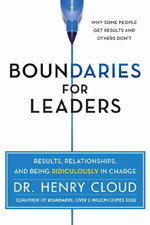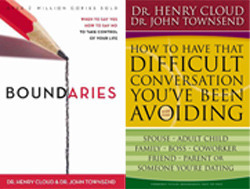Henry Cloud's Blog, page 32
May 19, 2014
4 Secrets To Set Boundaries That Succeed
 “I don’t know if this boundary stuff really works for me,” Jill told me (Dr. Townsend). She was having problems with her 14-year-old daughter. Holly was skipping classes at school and had been caught drinking. Things were definitely headed in the wrong direction, and Jill wanted to act before it was too late.
“I don’t know if this boundary stuff really works for me,” Jill told me (Dr. Townsend). She was having problems with her 14-year-old daughter. Holly was skipping classes at school and had been caught drinking. Things were definitely headed in the wrong direction, and Jill wanted to act before it was too late.
“What happened?” I asked.
“Well, I sat down and told her, ‘Things are going to have to change around here. I’m going to set some boundaries with you. This is for your own good. You need to stop the ditching and drinking.’”
“What happened then?”
“She got mad at me, yelled, and left the room. The next weekend she was drinking again. I guess the next step is to send her to some adolescent rehab center—”
“Slow down, Jill. That may be in the cards, but you’re ahead of yourself. I don’t think you’ve given Holly or yourself a real go in setting boundaries. Boundaries aren’t about just giving someone their marching orders and then expecting them to salute. Especially teens.”
Jill had thought that simply being direct and honest was all that was needed to set boundaries. But it isn’t. There are four necessary principles that must be used in order make boundaries succeed in difficult situations:
Principle #1 – Love: I Am on Your Side
Always begin with love. To the best of your ability, convey to your teen (or anyone else) that you care about her welfare and have her best interests at heart.
Boundaries separate people, at least at first. Because of this, setting boundaries often causes conflict. Teens get mad and feel persecuted. They resist boundaries, because boundaries seem harsh and uncaring.
Love will help your teen hear what you are saying, accept the boundaries, and tolerate the consequences. This is true for all of us. When we hear hard truths from someone who cares about us, we need to know that the person is on our side. Otherwise, we are liable to feel hated, bad, worthless, unloved, offended, or victimized. Those feelings don’t lead to a happy ending.
To demonstrate love to your teen, tell her something like this: “I am on your side. I am not doing this because I’m mad, or want to punish you, or don’t care about you. I am doing this because I want your best.” You may not be feeling especially close to your teen when you set a limit, but love is greater than momentary feelings. Love is a stance, an attitude to take: you are on your teen’s side and for her good.
Principle #2 – Truth: I Have Some Rules and Requirements
Love opens the door to change but is not enough. Truth provides guidance, wisdom, information, and correction. Truth exists in the form of rules, requirements, and expectations for your teen. They are the dos and don’ts that spell out what your teen needs to do and what he needs to avoid.
Why is this important? Because your teen needs to know what the line is, so that he can choose whether or not to cross it. If there is no line, you won’t be able to blame your teen for crossing it. Sometimes a boundary doesn’t work because the parent didn’t clearly define the boundary.
By the way, if you feel weird or mean about having rules and expectations for your teens, you should see that feeling as a problem! It is not cruel and unloving for parents to have requirements for their teen’s behavior and attitude. Teens who have reasonable expectations for their behavior tend to do better in life, because boundaries are part of life. Adults can’t show up for work late, nor should they yell at their spouse when they’ve had a bad day. As long as the rules are appropriate for the situation, when you bring them into the relationship, you are helping your child see that structure and responsibility are normal and expected in life.
Don’t get mad. Get clear. Let your adolescent know what is expected and required in behavior and attitude. Write down your rules and regulations and post them on the refrigerator. Otherwise, when he feels you are being unfair in your discipline, he may be right.
Principle #3 – Freedom: You Can Choose to Respect or Reject the Rules
Your teen has probably exercised freedom to make some poor choices, and you haven’t seen much good come from that. But freedom is absolutely necessary, for a couple of reasons:
First, you can’t really make your teen choose the right thing. It can be scary to realize this, but realize it you must. There is a lot you can’t control in your teen. You aren’t present for much of her life, so you can’t control what she does in school and with her friends. Nor can you really control what she does at home, if you think about it.
Second, even if you could “make” your teen do the right thing, it wouldn’t help him develop into a mature, loving, responsible person. That is not how God designed the growth process. He orchestrated things so that we must be free to choose good or bad, to choose him or reject him. That is the only way we can learn from our mistakes, and the only way we can truly love each other from the heart.
Of course, freedom has a limit. If a problem is life-threatening or dangerous, you certainly should intervene. Intervention in the form of involuntary hospitalizations, arrests, or residential treatment programs sometimes has to happen in extreme cases. You want your child alive to be able to grow. But as much as possible, affirm and protect your teen’s freedom.
Principle #4 – Consequences: Here Is What Will Happen
Teens need consequences, because that’s how they experience a fundamental law of life: good behavior brings good results and bad behavior brings uncomfortable results. Depending on the situation, your teen may need to experience something small, such as having to do extra chores at home. Or the consequence may need to be a big deal, such as grounding for a long time with few privileges. But the idea is the same: consequences teach us how to be responsible.
Consequences should be both said and done. Your teen needs to know what will happen on the other side of the line. If you state consequences without enforcing them, you will train your teen to ignore you, because your bark has no bite. The next time you decide you need to have a boundary-setting conversation, be sure you say:
Love – “I love you and am on your side.”
Truth – “I have some rules and requirements for your behavior.”
Freedom – “You can choose to respect or reject these rules.”
Consequences – “Here is what will happen if you reject these rules.”
When you use these four principles, you are providing the stability, clarity, and motivation your teen needs to begin to learn self-control and responsibility.
 Discover how your teenager thinks. Learn how to apply biblical principles to specific problems. Boundaries with Teens can help you establish wise and loving limits that make a positive difference in your adolescent, in the rest of your family, and in you.
Discover how your teenager thinks. Learn how to apply biblical principles to specific problems. Boundaries with Teens can help you establish wise and loving limits that make a positive difference in your adolescent, in the rest of your family, and in you.
Image courtesy of stockimages at FreeDigitalPhotos.net
The post 4 Secrets To Set Boundaries That Succeed appeared first on Boundaries Books.
May 15, 2014
Leadership Conversation with Dr. Henry Cloud and Dan Cathy
Enjoy this insightful video as Dan Cathy, president of Chick-Fil-A, interviews Dr. Henry Cloud about the importance of boundaries in the life of a business leader.
Why do certain companies flourish under one leader while other companies decline? Why do some teams outperform other teams within the same company?
Dr. Cloud’s book, Boundaries for Leaders, provides the tools and techniques that leaders need to achieve the performance they desire. Drawing on the latest findings from neuroscience, Dr. Cloud shows why it’s critical for leaders to set the conditions that make people’s brains perform at their highest levels. How do great leaders do this? One way is through the creation of “boundaries,” which are structures that determine what will exist and what will not.
Discover seven leadership boundaries that set the tone and culture for a results-driven organization, including how to:
Help people focus their attention on the things that matter most.
Build the emotional climate that drives brain functioning.
Facilitate connections that boost energy and momentum.
Create organizational thought patterns that limit negativity and helplessness.
Identify paths for people to take control of the activities that drive results.
Create high-performance teams organized around the behaviors that drive results.
Lead yourself in a manner that protects the vision.
Boundaries for Leaders will explain how leaders are ridiculously in charge of all these elements, and they must own what they either create or allow to exist.
 Read a sample chapter, watch a video, and dive deeper into the leadership principles that Dr. Cloud discusses in his book, Boundaries for Leaders
Read a sample chapter, watch a video, and dive deeper into the leadership principles that Dr. Cloud discusses in his book, Boundaries for Leaders
The post Leadership Conversation with Dr. Henry Cloud and Dan Cathy appeared first on Boundaries Books.
May 12, 2014
Setting Boundaries with the Sins of Your Family
 Susie had a problem that I (Dr. Townsend) had seen countless times before. This thirty-year-old woman would return from a visit to her parents’ home and suffer a deep depression. When she described her problem to me, I asked her if she noticed that every time she went home to visit, she came back extremely depressed.
Susie had a problem that I (Dr. Townsend) had seen countless times before. This thirty-year-old woman would return from a visit to her parents’ home and suffer a deep depression. When she described her problem to me, I asked her if she noticed that every time she went home to visit, she came back extremely depressed.
“Why that’s ridiculous,” she said. “I don’t live there anymore. How could the trip affect me this way?”
When I asked her to describe the trip, Susie told of social gatherings with old friends and family times around the dinner table. These were fun, she said, especially when it was only family.
“What do you mean ‘only family’?” I asked.
“Well, other times my parents would invite some of my friends over, and I didn’t like those dinners as well.”
“Why was that?” Susie thought for a minute and then replied, “I guess I start to feel guilty.” She began to recount the subtle remarks her parents would make comparing her friends’ lives to hers. They would talk of how wonderful it is for grandparents to have a “hands on” role in raising the children. They would talk of the community activities her friends were doing and how wonderful she would be at those activities if she only lived there. The list went on and on.
Susie soon discovered that, when she returned home, she felt as if she were bad for living where she lived. She had a nagging sense that she really should do what her parents wanted her to do.
Susie had a common problem. She had made choices on the outside. She had moved away from the family she grew up in to pursue a career on her own. She had been paying her own bills. She had even gotten married and had a child. But on the inside, things were different. She did not have emotional permission to be a separate person, make free choices about her life, and not feel guilty when she did not do what her parents wanted. She could still yield to pressure.
The real problem is on the inside. Remember, boundaries define someone’s property. Susie, and others like her, do not really “own” themselves. People who own their lives do not feel guilty when they make choices about where they are going. They take other people into consideration, but when they make choices for the wishes of others, they are choosing out of love, not guilt; to advance a good, not to avoid being bad.
Why Do We Act This Way?
The patterns you learn at home growing up are continued into adulthood with the same players: lack of consequences for irresponsible behavior, lack of confrontation, lack of limits, taking responsibility for others instead of yourself, giving out of compulsion and resentment, envy, passivity, and secrecy. These patterns are not new, they have just never been confronted and repented of.
These patterns run deep. Your family members are the ones you learned to organize your life around, so they are able to send you back to old patterns by their very presence. You begin to act automatically out of memory instead of growth.
To change, you must identify these “sins of the family” and turn from them. You must confess them as sins, repent of them, and change the way you handle them. The first step in establishing boundaries is becoming aware of old family patterns that you are still continuing in the present.
Look at the struggles you are having with boundaries in your family of origin, identify which laws are being broken, and then pinpoint the resulting negative fruit in your life.
 If your family dynamics are driving you crazy, read “How to Resolve Boundaries Problems with Your Family” in Chapter 7 of the award-winning book, Boundaries.
If your family dynamics are driving you crazy, read “How to Resolve Boundaries Problems with Your Family” in Chapter 7 of the award-winning book, Boundaries.
Click here to read a sample chapter, watch a video, and purchase your copy today.
The post Setting Boundaries with the Sins of Your Family appeared first on Boundaries Books.
May 8, 2014
How to Confront Your Mother in a Loving Way
 Recently a woman asked me (Dr. Townsend), “How can I confront my mom to open up and be more involved in my life?”
Recently a woman asked me (Dr. Townsend), “How can I confront my mom to open up and be more involved in my life?”
“Well, have you asked her?” I responded.
“Sure! I told her that it would be nice if she asked me how my life was going, but she still didn’t do anything.”
“Well, let’s not say that you asked her anything. Call it a suggestion, or maybe a mention of a good idea. But, there was no direct request. If she didn’t respond, you probably need to ratchet it up a bit and say something like, ‘Mom, you rarely ask me about myself; I seem to be the only one asking you about your life. I’d like you to ask me how my work, kids, and activities are doing.’”
It is easy to be indirect with parents, given all the emotional complexities involved. Sometimes a person will even think, “She is my mom. She should know I need this without my being blunt about it.” But if what you have said is not getting through, you have to be direct and clear, though not mean.
Confront your mother from a stance of being an adult, rather than from a position as being her child. The basic difference is to make your discussion more about the relationship and less about your needs. Here are some examples of both versions:
Child: “I want you to be there for me.”
Adult: “I want to be able to communicate openly with you.”
Child: “I need for you to respect me so that I can feel respected.”
Adult: “I want you to treat me with respect so that it doesn’t get in the way of our relationship.”
Child: “I want you to be able to hear me when I say no, because I feel bad about myself when you don’t.”
Adult: “I want you to be able to accept our different opinions so that we can have healthy conversations.”
Child: I want you to stop drinking so that I can have the mom I never had.”
Adult: “I want you to stop drinking, because none of us can connect with you, and it hurts us and you, too.”
Decide Whether a Conversation Is Worth It
You may discover over time that confronting your mother is just not worth the cost. Barring life-threatening or very serious issues, you may need to let some things go and accept things the way they are.
You don’t need to leave the relationship or do anything radical. However, you may need to grieve the relationship you would like to have with your mom and connect with her in whatever way you can. Find the ceiling of what your mom is willing to look at, and love the rest. Again, this is moving from a position of dependency to a position of love. Your mom may never be able to be a part of your emotional support system. That’s okay, because you can get those needs met from other supportive people. However, you can also find much satisfaction and enjoyment in finding ways to safely confront and connect with your mother.
We hope you have a meaningful Mother’s Day!
 Need more help interacting with your mom? Get our Mother’s Day Survival Kit, which includes two books specifically designed to help you set healthy boundaries and communicate better with your mom:
Need more help interacting with your mom? Get our Mother’s Day Survival Kit, which includes two books specifically designed to help you set healthy boundaries and communicate better with your mom:
Boundaries (Chapter 7 deals with family conflict)
How to Have That Difficult Conversation You’ve Been Avoiding (Chapter 24 deals with parents)
 Join our Boundaries email newsletter and get “10 Tips to Build Boundaries with Your Mom” for free! Click here to download.
Join our Boundaries email newsletter and get “10 Tips to Build Boundaries with Your Mom” for free! Click here to download.
Mom photo courtesy of imagemajestic from FreeDigitalPhotos.net
The post How to Confront Your Mother in a Loving Way appeared first on Boundaries Books.
May 5, 2014
How to Handle Guilt Messages from Your Mom
 Tabitha telephoned her mother, who answered the phone weakly with hardly any voice at all. Concerned, thinking she was sick, Tabitha asked, “Mother, what’s wrong?”
Tabitha telephoned her mother, who answered the phone weakly with hardly any voice at all. Concerned, thinking she was sick, Tabitha asked, “Mother, what’s wrong?”
“I guess my voice doesn’t work very well anymore,” she replied. “No one calls me since you children left home.”
No weapon in the arsenal of a controlling person is as strong as the guilt message. Daughters or sons with poor boundaries almost always internalize guilt messages leveled at them by their mother; they obey guilt-inducing statements that try to make them feel bad. Consider these:
“How could you do this to me after all I’ve done for you?”
“It seems that you could think about someone other than yourself for once.”
“How can you abandon me like this?”
“Maybe after I’m dead and gone, you’ll be sorry.”
“How can you call yourself a Christian?”
“Doesn’t the Bible say ‘Honor your parents’?”
“You must really have a spiritual problem to be acting this way.”
“You know how it’s turned out in the past when you haven’t listened to me.”
“You have no idea how much I’ve sacrificed for you.”
A mother who says these types of things is trying to make you feel guilty about your choices. She is trying to make you feel bad about deciding how you will spend your own time or resources, about growing up and separating from her, or about having a life separate from the family.
However, in the biblical parable told in Matthew 20:1-16, Jesus says that we are to give and not be self-centered. Notice that it does not say that we have to give whatever anyone wants from us. We are in control of our giving.
You can probably recognize guilt messages when you hear them. But if you feel bad about your response, maybe you have not looked specifically at the approach your mother or other people are using. Here are six suggestions about dealing with these external messages:
1. Recognize the guilt messages.
Some people swallow guilt messages without seeing how controlling they are. Sure, we need to be open to rebuke and feedback, because we need to know when we’re being self-centered. However, guilt messages are not given for your growth and good. They are given to manipulate and control.
2. Guilt messages are really anger in disguise.
The guilt sender is failing to openly admit her anger at you for what you are doing, probably because that would expose how she is trying to control you. She focuses on you and your behavior, rather than on how she feels. Focusing on her feelings would get her too close to responsibility.
3. Guilt messages hide sadness and hurt.
Instead of expressing and owning these feelings, some parents try to steer the focus onto you and what you are doing. Recognize that guilt messages are sometimes an expression of a person’s sadness, hurt, or need.
4. If guilt works on you, recognize that it is your problem.
That’s right, the core issue is not your mother’s problem. Realize where the real trouble resides, which is inside your mind. Then you will be able to deal with the outside correctly, using love and limits. If you continue to blame your mother for “making” you feel guilty, then she has power over you. And, you are saying that you will only feel good when she stops doing that. You are giving her control over your life. Stop blaming other people.
5. Do not explain or justify.
Only guilty individuals defend their position, and that only plays into the guilt sender’s message. You do not always owe an explanation. Just tell what you have chosen. If you tell your mother the reason why you made a certain decision in order to help her understand, that is okay. But, if you justify your reason in order to get her to stop making you feel bad or to resolve your inner guilt, then you are playing into the guilt trap.
6. Be assertive and interpret guilt-styled messages as being about the other person’s feelings.
Take time to acknowledge how your mother feels by saying like:
“Mom, it sounds like you are angry that I chose to…”
“It sounds like you are sad that I will not…”
“I understand you’re unhappy about what I have decided to do. I’m sorry you feel that way.”
“I realize this is disappointing to you. How can I help?”
“It’s hard for you when I have other things to do, isn’t it?”
The main principle is this: When someone tries to make you feel guilty, empathize with the distress that she might be feeling. But, make it clear that it is her distress.
Remember, love and limits are the only clear boundaries. If you react negatively, you have lost your boundaries. Proverbs 25:28 says, “Like a city whose walls are broken down is a man without self-control.” If your mother has the power to make you react, then she is inside your walls, inside your boundaries. Stop reacting. Be proactive. Give empathy. “Mom, it sounds like life is hard right now. Tell me about it.” Sometimes people who give guilt messages just want to tell someone how hard it is. Be a listener, but don’t take the blame.
Remember our earlier example of the mother who tried to make her daughter, Tabitha, feel guilty? A woman with good boundaries would empathize with her mother and say, “It sounds like you are feeling lonely, Mom.” She would make sure that her mom hears that she knows the feeling beneath the guilt message.
As much as possible, bring truth and grace to the relationship with your mom. What a blessing to be a redemptive force for their lives, even in her later years!
 Need help interacting with your mom this Mother’s Day? Get our Mother’s Day Survival Kit, which includes two books specifically designed to help you set healthy boundaries and communicate well with your mom:
Need help interacting with your mom this Mother’s Day? Get our Mother’s Day Survival Kit, which includes two books specifically designed to help you set healthy boundaries and communicate well with your mom:
Boundaries (Chapter 7 deals with family conflict)
How to Have That Difficult Conversation You’ve Been Avoiding (Chapter 24 deals with parents)
 Join our Boundaries email newsletter and get “10 Tips to Build Boundaries with Your Mom” for free! Click here to download.
Join our Boundaries email newsletter and get “10 Tips to Build Boundaries with Your Mom” for free! Click here to download.
The post How to Handle Guilt Messages from Your Mom appeared first on Boundaries Books.
May 1, 2014
What If My Teen Won’t Change?
Let’s suppose you do have a teen who is not doing well and is almost out of the house. Consider the alternative. If you give up and go into survival mode, your teen has not experienced the benefit of being around loving, truthful, and strict parents and will be that much less ready for successful adulthood. Even if your teen resisted every effort you attempted and you saw no change at all, something good has still happened. In those last months and weeks, she has experienced and internalized some events that cannot be easily shaken loose. For that brief time, love, responsibility, freedom, and consequences were applied to your teen’s life in a way that was healthy and good.
As a psychologist, I (Dr. Townsend) have met many adults who blew off their parents’ help when they were teenagers, only to remember years later what had been done. And they know at some level that that was a good way for them to live. So even if you don’t see the fruit today or tomorrow, your teen will still have some memories of the way life should be lived. Take encouragement from the words of the prodigal son in the Bible who finally “got it”:
“When he came to his senses, he said, ‘How many of my father’s hired men have food to spare, and here I am starving to death! I will set out and go back to my father and say to him: Father, I have sinned against heaven and against you. I am no longer worthy to be called your son; make me like one of your hired men.’” (Luke 15:17-19)
Don’t count on getting an apology like that. Instead, fight the good fight of setting boundaries — all the way to the last minute that your teen is in your charge. Your investment of time and energy will not be in vain.
 Discover how your teenager thinks. Learn how to apply biblical principles to specific problems. Boundaries with Teens can help you establish wise and loving limits that make a positive difference in your adolescent, in the rest of your family, and in you.
Discover how your teenager thinks. Learn how to apply biblical principles to specific problems. Boundaries with Teens can help you establish wise and loving limits that make a positive difference in your adolescent, in the rest of your family, and in you.
The post What If My Teen Won’t Change? appeared first on Boundaries Books.
April 28, 2014
Is Setting Boundaries Being Selfish?
“Now, wait a minute,” Teresa said, shaking her head. “How can I set limits on those who need me? Isn’t that living for me and not for God?”
Teresa was voicing one of the main objections to boundary setting for Christians: a deep-seated fear of being self-centered, interested only in one’s own concerns and not those of others.
It is absolutely true that we are to be a loving people. Concerned for the welfare of others. In fact, the number-one hallmark of Christians is that we love others (John 13:35).
So don’t boundaries turn us from other-centeredness to self-centeredness? The answer is no. Appropriate boundaries actually increase our ability to care about others. People with highly developed limits are the most caring people on earth. How can this be true?
First, let’s make a distinction between selfishness and stewardship. Selfishness has to do with a fixation on our own wishes and desires, to the exclusion of our responsibility to love others. Though having wishes and desires is a God-given trait (Proverbs 13:4), we are to keep them in line with healthy goals and responsibility.
For one thing, we may not want what we need. Mr. Insensitive may desperately need help with the fact that he’s a terrible listener. But he may not want it. God is much more interested in meeting our needs than he is granting all our wishes. For example, he denied Paul’s wish to heal his “thorn in the flesh” (2 Corinthians 12:7–10). At the same time, he met Paul’s needs to the point that Paul felt content and full:
I know what it is to be in need, and I know what it is to have plenty. I have learned the secret of being content in any and every situation, whether well fed or hungry, whether living in plenty or in want. I can do everything through him who gives me strength. (Philippians 4:12–13)
It helps the Christian afraid of setting boundaries to know that God meets our needs. “God will meet all your needs according to his glorious riches in Christ Jesus” (Philippians 4:19). At the same time, God does not make our wishes and desires “all bad” either. He will meet many of them.
Our Needs Are Our Responsibility
Even with God’s help, however, it is crucial to understand that meeting our own needs is basically our job. We can’t wait passively for others to take care of us. Jesus told us to “Ask … seek … knock” (Matthew 7:7). We are to “work out [our] salvation with fear and trembling” (Philippians 2:12). Even knowing that “it is God who works in [us]” (Philippians 2:13), we are our own responsibility.
This is a very different picture than many of us are used to. Some individuals see their needs as bad, selfish, and at best, a luxury. Others see them as something that God or others should do for them. But the biblical picture is clear: our lives are our responsibility.
At the end of our lives this truth becomes crystal clear. We will all “appear before the judgment seat of Christ, that each one may receive what is due him for the things done while in the body, whether good or bad” (2 Corinthians 5:10). A sobering thought.
The Gift of Stewardship
A helpful way to understand setting limits is that our lives are a gift from God. Just as a store manager takes good care of a shop for the owner, we are to do the same with our souls. If a lack of boundaries causes us to mismanage the store, the owner has a right to be upset with us.
We are to develop our lives, abilities, feelings, thoughts, and behaviors. Our spiritual and emotional growth is God’s “interest” on his investment in us. When we say no to people and activities that are hurtful to us, we are protecting God’s investment. As you can see, there’s quite a difference between selfishness and stewardship. That’s why boundaries make life better!
Do you have a story or example of how Boundaries has improved your life? We want to hear it. Click here to share your story with us.
The post Is Setting Boundaries Being Selfish? appeared first on Boundaries Books.
April 24, 2014
Setting Boundaries and Fearing Your Teen’s Withdrawal
 Some parents fear that if they set boundaries with teens, it will cause their son or daughter to detach themselves and withdraw their love from them. This fear can cause these parents to avoid boundaries at all costs, and to do their best to keep their kid connected. When this happens, it teaches teens that they can get their way and avoid limits by cutting off the love supply. These adolescents often have difficulty experiencing healthy adult relationships, because they have learned to withdraw love, as a form of emotional blackmail, until the other person caves in. You don’t want this relational future for your teen.
Some parents fear that if they set boundaries with teens, it will cause their son or daughter to detach themselves and withdraw their love from them. This fear can cause these parents to avoid boundaries at all costs, and to do their best to keep their kid connected. When this happens, it teaches teens that they can get their way and avoid limits by cutting off the love supply. These adolescents often have difficulty experiencing healthy adult relationships, because they have learned to withdraw love, as a form of emotional blackmail, until the other person caves in. You don’t want this relational future for your teen.
If you are vulnerable to fear, you may have some sort of dependency on your teen’s goodwill and feelings toward you. You may be trying to get your teen to meet your need for love and connection. If so, you are in jeopardy of not doing right by your child.
To resolve your fear of withdrawal of love, connect with other adults who will support, affirm, and encourage you. Such adults can meet your relational needs. Use their good feelings to fill the vacuum so that when your teen withdraws because of some limits you have imposed, you can tolerate the withdrawal.
When your teen withdraws, take the initiative to go after him and try to reconnect. Teens sometimes don’t have the skills to pull themselves back into relationship, so they need their parents to help them. But while you are inviting your teen back into connection with you, keep your requirements and expectations intact. Your teen still needs them.
Remember that teens need a certain amount of time and space to pull away from parents — not totally away, but enough to form their own opinions, identity, and values. When you experience this withdrawal, realize it’s a normal part of your teen’s developmental passage. Don’t personalize it. Instead, help your teen know that it’s a good thing for him and that you’ll be there when he or she wants to reconnect.
 Learn more ways to help your teen grow into a mature, responsible adult by reading Boundaries with Teens.
Learn more ways to help your teen grow into a mature, responsible adult by reading Boundaries with Teens.
For additional help with anger issues in children, read our free resource: Tame Your Child’s Temper Tantrum.
Image courtesy of David Castillo Dominici / FreeDigitalPhotos.net
The post Setting Boundaries and Fearing Your Teen’s Withdrawal appeared first on Boundaries Books.
April 21, 2014
How Happiness Can Hurt Your Marriage
 I (Dr. Cloud) was talking to a young man one day about his girlfriend. He was thinking about getting married, and he had questions about their relationship. Several times during the conversation, he said that something she did not “make him happy.” It was clear that this was a theme for him. She was not “making him happy.”
I (Dr. Cloud) was talking to a young man one day about his girlfriend. He was thinking about getting married, and he had questions about their relationship. Several times during the conversation, he said that something she did not “make him happy.” It was clear that this was a theme for him. She was not “making him happy.”
When I asked, he said that she wanted him to deal with some things in the relationship. He needed to do some work that took effort. It was not a “happy” time. When he had to work on the relationship, he no longer liked it.
At first, I was trying to understand what the difficulties were, but the more I listened, the more I saw that he was the difficulty. His attitude was, “If I’m not happy, something bad must be happening.” And his immediate conclusion was always that the “bad” was in someone else, not him. From his perspective, he was not part of any problem, much less part of the solution. Finally, I had heard about as much as I could take of his self-centered ramblings.
“I think I know what you should do,” I said.
“What?” he asked.
“I think you should get a goldfish,” I replied.
Looking at me as if I were a little crazy, he asked, “What are you talking about? Why do you say that?”
“It sounds to me like that is about the highest level of relationship you are ready for. Forget the marriage thing.”
“What do you mean by ‘the highest level of relationship’?”
“Well, even a dog makes demands on you. A dog has to be let out to go to the bathroom. You have to clean up after it. Other times, it requires time from you when you don’t want to give it. A dog might interfere with your happiness. Better get a goldfish. A goldfish doesn’t ask for much. But a woman is completely out of the question.”
Now we had something to talk about. This person’s greatest value was his own happiness and his own immediate comfort. And I can’t think of a worse value in life, especially a life that includes marriage. Why? Is this a killjoy attitude? Hardly. I am not advocating misery. I hate pain. But I do know this: People who always want to be happy and pursue it above all else are some of the most miserable people in the world.
The reason is that happiness is a result. It is sometimes the result of having good things happen. But usually it is the result of our being in a good place inside ourselves and our having done the character work we need to do so that we are content and joyful in whatever circumstance we find ourselves. Happiness is a fruit of a lot of hard work in relationships, career, spiritual growth, or a host of other arenas of life. But nowhere is this as true as in marriage.
Marriage is a lot of work, period. I don’t know anyone who has been married very long who does not attest to that. When couples do the right kind of work—character work—they find that they can gain more happiness in their marriage than they thought possible. But it always comes as a result of going through some difficult moments. Conflicts, fears, and old traumas. Big and small rejections, arguments, and hurt feelings. The disillusionment of someone being different than was imagined. The difficult task of accepting imperfections and immaturity that are larger than one thinks they should be.
All of these things are normal, and all of these things are workable. And if people work through them, they reach happiness again, usually a happiness of a deeper and better sort. But if they hit these inevitable walls and have the attitude that this problem is “interfering with my happiness,” they are in real trouble. They will be angry with the “inconvenience” of their happiness being interrupted and will refuse to solve the issues or will just leave the relationship. If happiness is our guide and it goes away momentarily, we will assume that something is wrong.
The truth is (and this is why happiness is such a horrible goal) that when we are not happy, something good may be happening. You may have been brought to that moment of crisis because of a need for growth, and that crisis may be the solution to much of what is wrong with your life. If you could grasp whatever it is that this situation is asking you to learn, it could change your entire life.
This is why the Bible tells us to “Consider it pure joy, my brothers, whenever you face trials of many kinds, because you know that the testing of your faith develops perseverance. Perseverance must finish its work so that you may be mature and complete, not lacking anything. If any of you lacks wisdom, he should ask God, who gives generously to all with out finding fault, and it will be given to him” (see James 1:2–5).
 Discover more ways to make marriage better than you imagined it could be with Boundaries in Marriage.
Discover more ways to make marriage better than you imagined it could be with Boundaries in Marriage.
The post How Happiness Can Hurt Your Marriage appeared first on Boundaries Books.
April 17, 2014
Beyond Boundaries Video with Dr. John Townsend
 Do you ever wonder when it’s the right time to reconnect with someone who broke your trust? Do you wrestle with knowing how to tell if someone has truly changed after you set boundaries with him or her? These are big questions that Dr. John Townsend answers in his book, Beyond Boundaries.
Do you ever wonder when it’s the right time to reconnect with someone who broke your trust? Do you wrestle with knowing how to tell if someone has truly changed after you set boundaries with him or her? These are big questions that Dr. John Townsend answers in his book, Beyond Boundaries.
Today, we are excited to feature a 50-minute online webcast that Dr. Townsend recorded. In this video, he explains how to move past earlier pain in order to experience the love we want to enjoy. Hurtful relationships violate our trust, causing us to set healthy boundaries. But, to experience the freedom and love God designed us for, we eventually have to take another risk. We have to be willing to go “beyond boundaries.”
Watch as Dr. Townsend takes you beyond the pain of the past to discover how to re-enter a significant relationship. Whether you’re trying to restore a current relationship or begin a new one, his material based on Beyond Boundaries will help you:
Reinstate appropriate closeness with someone who broke your trust.
Discern when true change has occurred.
Reestablish appropriate connections in strained relationships.
Restore former relationships to a healthy dynamic.
Learn to engage and be vulnerable in a new relationship.
If you’re ready to go beyond boundaries, purchase the book or use the DVD video study with your small group.
Please share this encouraging video with your friends!
The post Beyond Boundaries Video with Dr. John Townsend appeared first on Boundaries Books.



